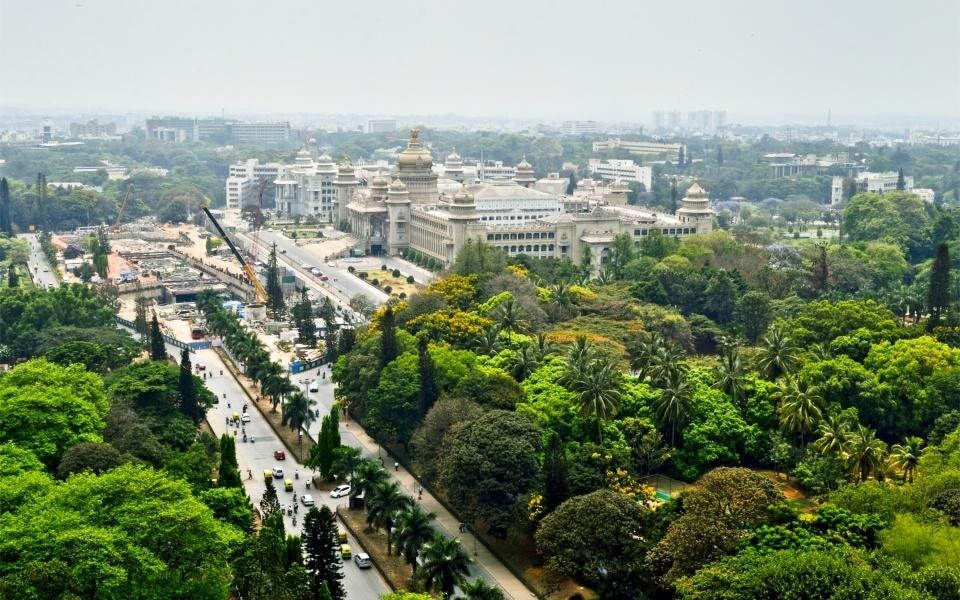Bangalore was a town; Bengaluru is a city. This transformation unfolded over decades. Having grown up and lived in this city, there's truly no place like it anywhere else in the world for me.
I experienced Bengaluru in the '90s and '00s. In hindsight, it felt like a confused teenager finding its way. It wasn’t an IT city, nor a pensioner’s paradise. The growing-up pangs were visible.
The airport was still within the city. Radio stations had sprung up in abundance. Summers were meh, and winters still required a sweater. Traffic on some roads was hell, while others were manageable. Whitefield and Electronic City were still outskirts. Office cabs whizzed past the Autorajas. Random flyovers cropped up, and rapid urbanization was afoot.
I grew up amidst this, with a curiosity about what the city was becoming. I wasn’t bothered by the changes; I hardly noticed or absorbed them. A visit to Whitefield during college left me awestruck by the list of companies and towering glass buildings. It was intimidating.
But who doesn’t like shiny malls and glass buildings, eh!? I got used to it.
Gradual changes hardly grab attention. With Bangalore, it was both gradual and fast. The pace was such that infrastructure is still playing catch-up. I lived in Vijayanagar and Rajajinagar, the old-school parts of Bangalore, where changes seeped in slowly.
The gradual change was this city becoming more cosmopolitan, blending the traditional with the modern. The faster change was Bangalore evolving into an IT and innovation hub from being a garden city. I can claim that we now have more startups calling Bengaluru home than there are trees left at Margosa Road and Sampige Road combined.
I've been living away from this city, my home, for a few years now. Distance often brings a fresh perspective, allowing me to notice changes overlooked earlier.
The change is shocking.
The city's airport moved to Devanahalli, a village then, now part of Bangalore. The last major urbanization you would have absorbed might have been Hebbal and a bit near Yelahanka, thanks to the Indian Airforce base. Each year, when I travel from the airport to home, it feels like the city has crept in even closer. The traffic thickens up earlier than the infamous Hebbal flyover now.
Constructions, roads dug up, metro pillars, flyovers, white-topping – it’s an infinite loop. This city feels like it's in a video game version of Caesar or Sim City. Forever building.
I live in an apartment. Bangalore was never an apartment city. Locals still struggle to wrap their heads around it. Independent houses and multiple-floor housing still dominate many parts of this city. I get it; it solves housing problems, our purchasing power has gone up, and the aspirational middle-class story, etc. But the number of apartments cropping up is nauseating!
Over the past few years, the city lost many lakes—not due to natural causes but due to urban development encroaching upon them.
Each year, the metro sluggishly opens a few more routes, long behind schedule. Ola/Uber prices go up a bit more. Delivery apps find new ways to make a profit. The city is expensive, on par if not more than global cities.
When I meet someone new in the city, I usually start with English or Hindi, not Kannada. Over the years, fewer people seem to speak Kannada, and I’m not sure if that’s a good thing. I’ve been an expat in another country, so I understand the reasons behind it. But the heart looks for familiarity.
And traffic, the less said about it, the better. Traffic is traffic, saar.
For me, the definition of home has changed over the years. As I wrote in this piece - Throughout our lives, we will inhabit many homes.
This is applicable to Bengaluru as well, I guess. It will change, it will trot, it will stumble, it will rise. But it is my home. It is my comfort.
Giddy up!
Avinash.





Love these two lines- they convey so much in few words
"I can claim that we now have more startups calling Bengaluru home than there are trees left at Margosa Road and Sampige Road combined." 😀
"the heart looks for familiarity."